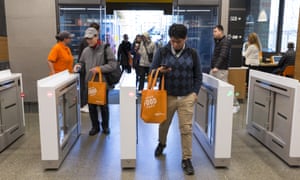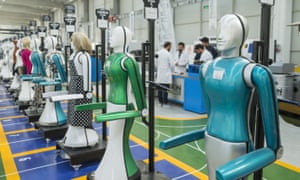Change is always disruptive but the upheaval likely as a result of the next wave of automation will be especially marked. Driverless cars, for instance, are possible because intelligent machines can sense and have conversations with each other. They can do things – or will eventually be able to do things – that were once the exclusive preserve of humans. That means higher growth but also the risk that the owners of the machines get richer and richer while those displaced get angrier and angrier.
The experience of past industrial revolutions suggests that resisting technological change is futile. Nor, given that automation offers some tangible benefits – in mobility for the elderly and in healthcare, for instance – is it the cleverest of responses.
A robot tax – a levy that firms would pay if machines were taking the place of humans – would slow down the pace of automation by making the machines more expensive but this too has costs, especially for a country such as Britain, which has a problem with low investment, low productivity and a shrunken industrial base. The UK has 33 robot units per 10,000 workers, compared with 93 in the US and 213 in Japan, which suggests the need for more automation not less. On the plus side, the UK has more small and medium-sized companies in artificial intelligence than Germany or France. Penalising these firms with a robot tax does not seem like a smart idea.
The big issue is not whether the robots are coming, because they are. It is not even whether they will boost growth, because they will. On some estimates the UK economy will be 10% bigger by 2030 as the result of artificial intelligence alone. The issue is not one of production but of distribution, of whether there is a Scandinavian-style solution to the challenges of the machine age.
In some ways, the debate that was taking place between the tech industry, politicians and academics in Davos last week was similar to that which surrounded globalisation in the early 1990s. Back then, it was accepted that free movement of goods, people and money around the world would create losers as well as winners, but provided the losers were adequately compensated – either through reskilling, better education, or a stronger social safety net – all would be well.
But the reskilling never happened. Governments did not increase their budgets for education, and in some cases cut them. Welfare safety nets were made less generous. Communities affected by deindustrialisation never really recovered. Writing in the recent McKinsey quarterly, W Brian Arthur put it this way: “Offshoring in the last few decades has eaten up physical jobs and whole industries, jobs that were not replaced. The current transfer of jobs from the physical to the virtual economy is a different sort of offshoring, not to a foreign country but to a virtual one. If we follow recent history we can’t assume these jobs will be replaced either.”
The Centre for Cities suggests that the areas hardest hit by the hollowing out of manufacturing are going to be hardest hit by the next wave of automation as well. That’s because the factories and the pits were replaced by call centres and warehouses, where the scope for humans to be replaced by machines is most obvious.

Still this won’t be sufficient. As the Institute for Public Policy Research has noted, new models of ownership are needed to ensure that the dividends of automation are broadly shared. One of its suggestions is a citizens’ wealth fund that would own a broad portfolio of assets on behalf of the public and would pay out a universal capital dividend. This could be financed either from the proceeds of asset sales or by companies paying corporation tax in the form of shares that would become more valuable due to the higher profits generated by automation.
But the dislocation will be considerable, and comes at a time when social fabrics are already frayed. To ensure that, as in the past, technological change leads to a net increase in jobs, the benefits will have to be spread around and the concept of what constitutes work rethought. That’s why one of the hardest working academics in Davos last week was Guy Standing of Soas University of London, who was on panel after panel making the case for a universal basic income, an idea that has its critics on both left and right, but whose time may well have come.

No comments:
Post a Comment